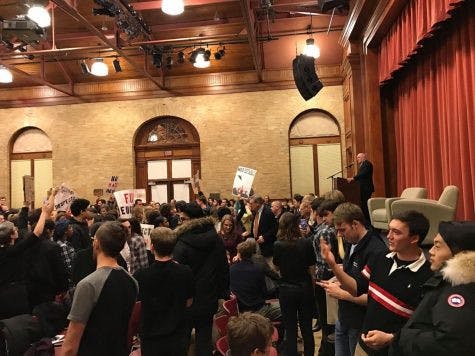On November 10, journalists from The Daily Northwestern, Northwestern University’s student-run newspaper, posted an editorial apologizing for the way in which they covered student protests of a speech by former Attorney General Jeff Sessions. The reporters expressed regret for posting photographs of protesters on Twitter without the subjects’ consent, as well as for using the school’s directory to find contact information for protesters. “Ultimately, The Daily failed to consider our impact in our reporting surrounding Jeff Sessions,” the editorial board wrote. “We know we hurt students that night, especially those who identify with marginalized groups.”
In response to this piece, mainstream journalists collectively recoiled, criticizing The Daily’s choice to apologize for using traditional journalistic methods in the strongest of terms. The New York Times’ White House Correspondent Maggie Haberman tweeted, “One of the biggest problems US journalists face in this day and age is how few people understand what standard news-gathering process looks like. A student newspaper saying normal process is somehow a bad thing is incredibly troubling.” Byron Tau of the Wall Street Journal agreed with Haberman’s characterization, tweeting, “In appalling ignorance of the basics of news-gathering, a Northwestern student newspaper: apologizes for taking photos of students protesting Jeff Sessions and for using the student directory to text students to ask if they wanted to be interviewed.” All across Twitter, news programs and newspapers, journalists expressed similar shock and horror at what they perceived to be an irresponsible abdication of proper journalistic practice.
The unified condemnation of this apology by media figures across the political spectrum is misplaced, misguided and representative of an outdated journalistic tradition. What the Northwestern reporters discovered is that journalism does not, should not and cannot simply “stick to discovering and reporting the facts.” Their apology expresses an understanding that the conventional journalistic focus on objectivity above all else very often ignores social and cultural context.
A student journalist should not simply ignore the feelings of those about whom they report; they cannot simply report the facts and detach themselves from the impacts that report has on its subjects. Those who lashed out so strongly against the Northwestern apology forget or refuse to recognize that student journalists are students. In a way that a New York Times reporter never really will be, student journalists are part of the story — they are subjects themselves. As people who also occupy the environment in which a story unfolds, and who have close relationships with those affected by the story, student reporters are often caught between journalistic orthodoxy on the one hand, and empathetic coexistence on the other.

When I was assigned to cover the protests of the Charles Murray speech at Middlebury in 2017, I experienced this dilemma firsthand. As a journalist, it is drilled into your head to gather as much information as you possibly can: talk to as many people from as many different perspectives as possible, take as many photos as possible, record as much audio as possible. But during the process of information-gathering for my article, I came to realize that the very information I collected could be weaponized in online communities. If I highlighted the stories of individuals who were involved in the protests, I would be identifying participants who might otherwise remain anonymous members of a crowd. I knew that the video I took inside the auditorium would likely attract comments expressing vitriol, rage and harassment toward the protesters.
I agonized over whether or not to publish the video and use people’s real names in my article because, whether it was “good journalism” or not, I would be directly responsible for exposing these people to harassment from those with much larger, more influential platforms. In spite of this, I decided to post the video, and I named protesters and organizers in my article. The reaction from society and the Internet was even more significant than I thought it would be. The videos I and a fellow Campus reporter took were immediately inundated with harassing, hateful comments. National news sources even used the videos in their coverage, which was generally neutral in tone but nonetheless exposed protesters’ faces to the world.
These individuals were and are my friends and colleagues, people I care and worry about (likely more so than a mainstream journalist would when it came to their subjects). When you live and go to school with the people who you cover, the stakes are higher and much more real. You have to live with the impacts of your coverage.
A student who chooses to protest is, of course, accepting some risk in doing so. And, high-profile actions like shutting down Charles Murray or protesting Jeff Sessions will inevitably garner more attention than most other events at a college. But these activists — especially minority students who have legitimate reasons to fear institutional and societal backlash — often rely and depend on the anonymity of a group for safety in standing up for something they believe in.
The protesters who shared their perspectives in my story knew that their names would be published, and they expressed desire to counter the narrative that had already taken hold nationwide. I still feel comfortable with that decision. However, I am less convinced that my decision to publish the video was correct. It is one of a small number of videos of the event that I know of, and it very clearly shows the identity of many protesters without their explicit permission. It may still be that the net benefit of documenting and sharing evidence of the event outweighs the risk of harm, which is what so many mainstream reporters argued in response to The Daily. Even so, I would have been irresponsible had I not considered the very real threats of harassment that the participants faced, and had I ignored the challenges that The Daily identifies.
What works for the New York Times does not, and should not, work for The Daily Northwestern and The Campus. Student journalists have a unique window into the situations that unfold on campus which gives an advantage over any external news source. This also means that we have both the ability and responsibility to be more empathetic than standard journalistic practice might suggest. I made a point of forging connections with the organizers and asking for permission in person because I had that opportunity, and thus it was necessary. Responding to the same obligation, the Northwestern reporters apologized for texting students out of the blue, not because such a practice is a breach of ethics in itself, but because there are better options available to journalists at universities.
The editors of The Daily Northwestern were right to apologize and challenge their own methods, even if those methods are considered acceptable by the wider journalistic community. They have the ability and the obligation to go beyond standard practice. As students, these reporters are part of every story themselves. They can do better.
Alex Newhouse is a member of the class of 2017 and a former Campus editor.



